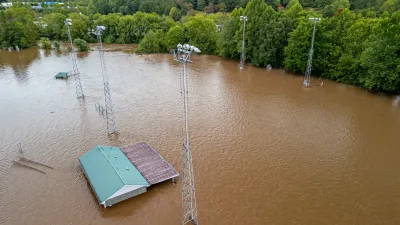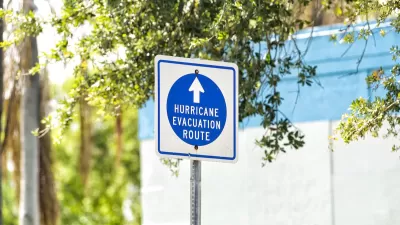Is CO2 buildup responsible for the enormous hurricane damage, or is it overdevelopment? Should we be spending so much attempting to reduce carbon emissions, or could it be better spent reducing problems that will be exacerbated by global warming?
Roger A. Pielke Jr., an environmental policy expert at the University of Colorado at Boulder, published an analysis "last month in the journal Natural Hazards Review, that is part of a controversial movement that argues global warming over the rest of this century will play a much smaller role in unleashing planetary havoc than most scientists think."
"Pielke acknowledges that there are enormous political hurdles to overcome with his strategy, and he recognizes that his views have made him and like-minded researchers the new pariahs of global warming."
"The radical middle -- that's how we talk about ourselves," said Daniel Sarewitz, a public policy expert at Arizona State University who has collaborated with Pielke on climate policy studies."
Hurricane analysis is used as an example of their perspective on global warming.
"Pielke's new analysis considered 207 hurricanes that hit the United States between 1900 and 2005. He looked at their strength and course and then overlaid them on a modern map that included all development over the years.
He found that the most devastating storm, had it occurred today, would be the Great Miami Hurricane of 1926, popularly known as the Big Blow. Its path through the now heavily developed southern tip of Florida would have caused $157 billion in damage, followed by Katrina, whose toll was $81 billion. Six of the top 10 most damaging storms occurred before 1945."
Thanks to Jennifer Alverson
FULL STORY: Global warming: Just deal with it, some scientists say

Planetizen Federal Action Tracker
A weekly monitor of how Trump’s orders and actions are impacting planners and planning in America.

Maui's Vacation Rental Debate Turns Ugly
Verbal attacks, misinformation campaigns and fistfights plague a high-stakes debate to convert thousands of vacation rentals into long-term housing.

San Francisco Suspends Traffic Calming Amidst Record Deaths
Citing “a challenging fiscal landscape,” the city will cease the program on the heels of 42 traffic deaths, including 24 pedestrians.

Amtrak Rolls Out New Orleans to Alabama “Mardi Gras” Train
The new service will operate morning and evening departures between Mobile and New Orleans.

The Subversive Car-Free Guide to Trump's Great American Road Trip
Car-free ways to access Chicagoland’s best tourist attractions.

San Antonio and Austin are Fusing Into one Massive Megaregion
The region spanning the two central Texas cities is growing fast, posing challenges for local infrastructure and water supplies.
Urban Design for Planners 1: Software Tools
This six-course series explores essential urban design concepts using open source software and equips planners with the tools they need to participate fully in the urban design process.
Planning for Universal Design
Learn the tools for implementing Universal Design in planning regulations.
Heyer Gruel & Associates PA
JM Goldson LLC
Custer County Colorado
City of Camden Redevelopment Agency
City of Astoria
Transportation Research & Education Center (TREC) at Portland State University
Jefferson Parish Government
Camden Redevelopment Agency
City of Claremont





























